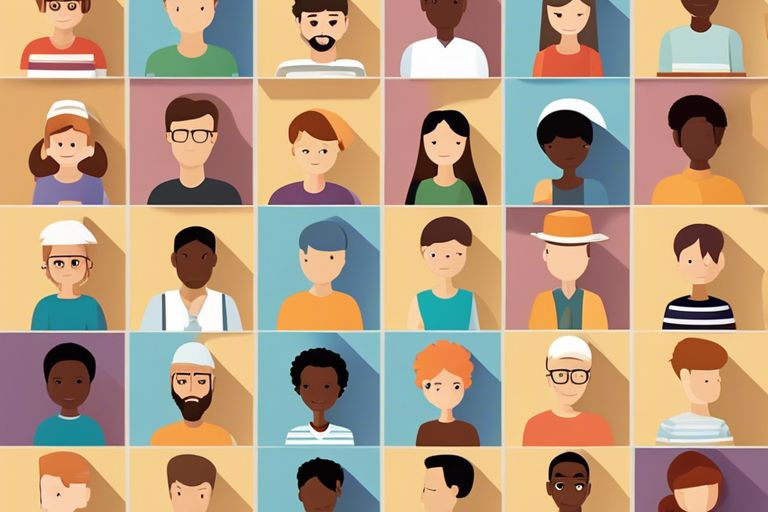Understanding how autism affects daily life is crucial for promoting awareness and acceptance. Individuals living with Autism Spectrum Disorder (ASD) navigate a world that can present unique challenges and hurdles. From sensory sensitivities to difficulties with social interactions, autism can significantly impact various aspects of daily life. However, it’s essential to recognise that individuals with autism also bring valuable perspectives and strengths to our society. By listening to their experiences and insights, we can gain a deeper understanding of autism and create a more inclusive environment for everyone. This blog post will explore firsthand perspectives from those living with ASD, shedding light on the challenges, triumphs, and realities of navigating daily life with autism.
Key Takeaways:
- Communication Challenges: People with Autism Spectrum Disorder (ASD) often face difficulties in communicating their needs and understanding social cues.
- Sensory Sensitivities: Individuals living with ASD may experience heightened sensory sensitivities, making everyday noises, lights, and textures overwhelming and distressing.
- Routine and Structure: Establishing routines and having a structured environment can significantly help individuals with ASD navigate daily life with more predictability and reduced anxiety.

Communication Challenges
Living with Autism Spectrum Disorder (ASD) presents a unique set of challenges, particularly in the realm of communication. Individuals with ASD often encounter difficulties in expressing themselves, understanding others, and interpreting social cues.
Social Interaction Difficulties
One of the primary challenges individuals with ASD face is social interaction difficulties. They may struggle with navigating social situations, maintaining eye contact, interpreting facial expressions, and understanding social norms. These challenges can make it hard for individuals with ASD to develop meaningful relationships and engage in typical social activities.
Nonverbal Communication and Misunderstandings
Another significant communication challenge for individuals with ASD is nonverbal communication and misunderstandings. People with ASD may have difficulty interpreting gestures, body language, and tone of voice, leading to miscommunications and confusion. This can result in misunderstandings in both personal relationships and professional settings.
It is essential for those interacting with individuals with ASD to be aware of these challenges and be patient in their interactions. Clear and direct communication can help bridge the gap and avoid misunderstandings, enabling individuals with ASD to communicate more effectively with those around them.
Sensory and Cognitive Experiences
Sensory Processing Differences
Individuals with Autism Spectrum Disorder (ASD) often experience sensory processing differences that can profoundly impact their daily lives. This can manifest as hypersensitivity or hyposensitivity to sensory stimuli such as sound, touch, taste, smell, and sight. For example, some individuals may be overwhelmed by loud noises or bright lights, while others may seek out intense sensory experiences.
These sensory differences can lead to challenges in various environments, from busy shopping centres to crowded classrooms. It is important to recognise and accommodate these differences to support individuals with ASD in navigating their surroundings effectively. By creating sensory-friendly spaces and providing access to tools like noise-cancelling headphones or sensory toys, we can help individuals with ASD feel more comfortable and engaged.
Executive Functioning and Organizational Skills
Executive functioning refers to a set of *cognitive skills* that are responsible for tasks such as planning, organising, prioritising, and self-regulation. Individuals with ASD often experience difficulties in *executive functioning* which can impact their ability to manage daily tasks and responsibilities. This can result in challenges with time management, impulse control, and adapting to changes in routine.
It is essential to provide support and strategies for individuals with ASD to develop their executive functioning and organisational skills. By breaking down tasks into smaller steps, creating visual schedules, and establishing routines, we can help individuals with ASD improve their ability to plan and execute tasks effectively.
Furthermore, individuals with ASD may benefit from *repetitive practice* and clear expectations to strengthen their executive functioning skills over time.

Navigating Daily Activities
Living with Autism Spectrum Disorder (ASD) can present unique challenges when it comes to navigating daily activities. From personal routines to professional settings, individuals with ASD often require specific adaptations to help them function effectively in various aspects of their lives.
Routines and Adaptations in Personal Life
In personal life, routines play a crucial role in providing structure and stability for individuals with ASD. Many find comfort in following set routines and may struggle with unexpected changes. As a result, incorporating predictability and consistency in daily schedules can greatly benefit those with ASD.
Moreover, individuals with ASD may require adaptations in their personal environments to reduce sensory overload or to create spaces that are calming and conducive to their well-being. These adjustments can include modifying lighting, minimising noise levels, or creating designated quiet areas where they can retreat when feeling overwhelmed.
Professional Life and Workplace Accommodations
Transitioning into the professional world can pose challenges for individuals with ASD, as navigating social interactions and workplace expectations may be particularly challenging. However, with appropriate accommodations and support, many individuals with ASD can thrive in various professions. Employers can implement adjustments such as providing clear instructions, allowing for flexible work arrangements, or offering additional training on social cues to create an inclusive work environment.
It is essential for employers and colleagues to understand and respect the diverse needs of individuals with ASD in the workplace. By fostering acceptance and appreciation of neurodiversity, organisations can harness the unique strengths and talents that individuals with ASD bring to the workforce.
Social Relationships and Support Systems
Family Dynamics and Friendships
For individuals living with Autism Spectrum Disorder (ASD), navigating family dynamics and friendships can present unique challenges. Family relationships may require extra understanding and patience, as those with ASD may struggle with social cues and communication. It is crucial for family members to educate themselves about ASD and adapt their communication styles to better support their loved one.
Similarly, forming and maintaining friendships can be difficult for individuals with ASD due to social difficulties and a preference for routines. It is important for friends to show compassion and acceptance, while also providing structured social situations that can help foster positive social interactions.
Accessing Community Resources and Support
Accessing community resources and support is essential for individuals with ASD to thrive. Community organisations, support groups, and specialised services can provide valuable assistance in areas such as education, employment, and independent living skills. These resources can offer a sense of belonging and understanding that is crucial for the overall well-being of individuals with ASD.
By utilising community resources and building a support network, individuals with ASD can access the help and guidance they need to overcome challenges and maximise their potential. It is important for individuals and their families to actively seek out and engage with these resources to ensure that they receive the best possible support in all aspects of their lives.
One particular resource that can be beneficial for individuals with ASD is occupational therapy, which focuses on developing skills that are essential for independent living and enhancing social interactions. Occupational therapists can provide tailored support to help individuals with ASD overcome daily challenges and achieve their goals in various areas of their lives.

Understanding the Impact of Autism on Daily Life – Insights from Individuals with ASD
In summarization, gaining insights into how autism affects daily life from those living with Autism Spectrum Disorder (ASD) is crucial in understanding the challenges they face. The perspectives shared by individuals with ASD shed light on the unique experiences, struggles, and strengths they possess, emphasising the importance of empathy, support, and inclusion. By listening to their voices and recognising their perspectives, we can foster a more compassionate and inclusive society that embraces neurodiversity. It is essential to remember that each individual with ASD is unique, and by acknowledging and respecting their experiences, we can create a more understanding and supportive environment for everyone.
FAQ
Q: What is autism and how does it affect daily life?
A: Autism, or Autism Spectrum Disorder (ASD), is a developmental disorder that affects communication, social interaction, and behaviour. Individuals living with ASD may experience challenges in navigating daily life due to difficulty with sensory processing, executive functioning, and social skills.
Q: How does sensory processing difficulties impact individuals with autism in their daily life?
A: Sensory processing difficulties can make individuals with autism hypersensitive or hyposensitive to sensory input such as touch, sound, or light. This can lead to sensory overload or sensory seeking behaviours that can affect their daily routines, relationships, and ability to engage in activities.
Q: What are some challenges individuals with autism face in social interactions?
A: Individuals with autism may have difficulties understanding social cues, making eye contact, maintaining conversations, or interpreting facial expressions and emotions. These challenges can impact their ability to form friendships, build relationships, and navigate social situations in daily life.
Q: How does executive functioning impact daily life for individuals with autism?
A: Executive functioning difficulties in areas such as planning, organisation, time management, and impulse control can make it challenging for individuals with autism to complete tasks, follow routines, and adapt to changes in their daily life. This can lead to feelings of anxiety and overwhelm.
Q: What strategies can help individuals with autism manage daily life challenges?
A: Strategies such as creating visual schedules, using sensory tools, practising social skills, and breaking tasks into smaller steps can help individuals with autism navigate daily life more effectively. It is important to provide support, understanding, and accommodation to help them succeed.
Q: How can family members and caregivers support individuals with autism in their daily life?
A: Family members and caregivers can offer encouragement, create a predictable environment, communicate clearly, and advocate for their needs. By fostering a supportive and understanding atmosphere, they can help individuals with autism thrive in their daily life.
Q: How can society promote inclusivity and support for individuals with autism in daily life?
A: Society can promote inclusivity and support for individuals with autism by raising awareness, providing education and training, offering employment opportunities, and creating sensory-friendly environments. By fostering acceptance and understanding, we can help individuals with autism lead fulfilling lives in their communities.






